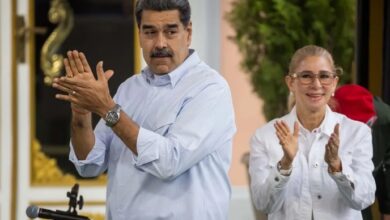These are the most important economic and political news of the week in Latin America and the world .

These were some of the most relevant news of this week. Photo: Pixabay
LatinAmerican Post | Santiago Goméz Hernández
Listen to this article
Leer en español: Bloqueo en el Canal del Suez, enfrentamientos en frontera colombo-venezolana y más noticias
International trade is waiting for the Suez Canal block
Experts assured this week that the removal of the ship stuck in the Suez Canal could take from days to weeks. The Japanese company ship, apparently, ended up trapped and blocking the route in the canal after strong winds on Thursday made it crash.
Un barco panameño quedó atrapado en el Canal de Suez y está dificultando gran parte del comercio internacional. Hay una fila eterna de barcos esperando cruzar. Las fotos son demenciales. pic.twitter.com/rPR0k5DUX5
— Pato Molina (@patriciomolina) March 24, 2021
This blockage on this important route that connects ships between Asia and Europe represents a delay in the delivery of goods, including oil, which has caused a slight increase in their value, given the risk of shortages.
About 10% of all world maritime trade passes through the Suez Canal, almost 19,000 ships each year, according to figures from the company that manages the canal.
Tension grows on the Colombia-Venezuela border
Attacks and confrontations with the dissidents of the FARC guerrillas and the Venezuelan armed forces have both states on red alert on the border. Since last Tuesday there have been clashes between the Colombian department of Arauca and the Venezuelan state of Apure. According to NGOs, several Venezuelans are trying to flee the abuses by the Bolivarian National Armed Forces towards Colombia.
Miles huyen por choques armados en Venezuela
Casi 4.000 venezolanos han huido desde #Venezuela hacia la localidad colombiana de #Arauquita tras los enfrentamientos registrados entre el ejército venezolano y, al parecer, disidentes de la disuelta guerrilla de las #FARC. (jpc) pic.twitter.com/rDumO0kmTp
— DW Español (@dw_espanol) March 26, 2021
However, the Maduro government denies these accusations and assures that everything is a plan orchestrated from Bogotá and with the support of Washington. The Venezuelan parliament with an official majority requested that the complaints be taken to international entities to "defend Venezuelan sovereignty."
Biden doubles his vaccination goal for his first 100 days
During the first press conference of the American president, Joe Biden, created several headlines. First, he announced that during his first 100 days in office his new goal is no longer 100 million coronavirus shots, but 200. In addition, he has already announced his intention to compete for reelection in 2024, although he does not have a campaign team yet ( Donald Trump had it almost immediately after entering the White House.)
#ÚLTIMAHORA Biden quiere inocular 200 millones dosis de vacunas para sus 100 días de gobierno #AFP pic.twitter.com/0x60dVaL6k
— Agence France-Presse (@AFPespanol) March 25, 2021
You may also be interested: Biden's response to the migration of the southern border of the United States
Israel: Netanyahu fails to win the majority in elections
Israeli Prime Minister Benjamin Netanyahu and his coalition did not achieve a majority in parliament, not even after the great results of the Israeli vaccination program. In the last elections, the pro-government bloc barely won 52 seats, out of a possible 120. The opposition was left with 57 and the independents (both on the right and Arabs) added the remaining 11.
Since the strategy of taking advantage of the success of the vaccination was not enough, it is most likely that both sectors will contest the government again in new elections.
Argentina leaves the Lima group
The government of President Alberto Fernández announced that it will leave this organization that sought to create diplomatic pressure against the Nicolás Maduro regime and force his departure. The Argentine Foreign Ministry argued that this decision is mainly due to the participation of the Venezuelan opposition within the group.
#Argentina dice que su salida del Grupo de Lima no es un apoyo a Madurohttps://t.co/kQJjgbM7pe pic.twitter.com/5DEe5rCzYU
— Los Tiempos (@LosTiemposBol) March 26, 2021
Fernández represents a center-left government and has the support of former President Cristina Fernández de Kirchner, who is the current vice president. The Ministry of Foreign Affairs closed its statement by reiterating that "the best way to help Venezuelans is to facilitate an inclusive dialogue that does not favor any particular sector, but to achieve elections accepted by the majority with international control."





